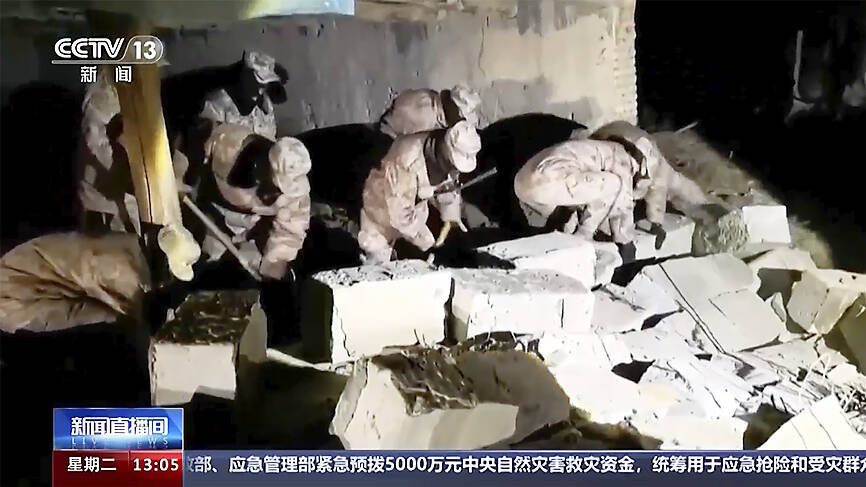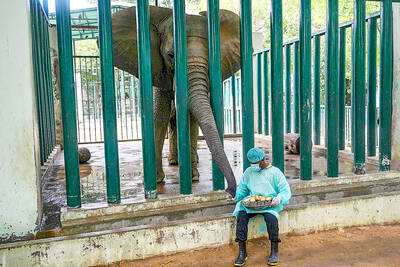A magnitude 7.1 earthquake early yesterday struck a sparsely populated part of China’s western Xinjiang region, causing extensive damage, but injuring just six people in freezing cold weather, authorities said.
The quake was the latest in a series of seismic events and natural disasters to hit the vast country’s western regions.
The quake rocked Uchturpan County in Aksu Prefecture shortly after 2am, the China Earthquake Networks Center said. Rescue crews were rushed to the area, with about 1,000 on hand by mid-day. The county is called Wushi in Mandarin.

Photo: AP / CCTV
Rescue crews combed through the rubble, overturning bricks and stone blocks in search of victims. Emergency survival gear including coats, tents and folding beds to help the thousands of people who fled their homes had arrived or were on their way, Xinhua news agency said.
Of the six people hurt, only two had serious injuries. Among the more than 120 buildings damaged, 47 houses collapsed, 78 houses were damaged and some greenhouses were reduced to plastic sheets and rubble, the government of the Xinjiang Uygur Autonomous Region posted on its official Weibo social media account.
The quake downed power lines, but electricity was quickly restored, Aksu authorities reported.
Mountainous Uchturpan County had about 233,000 people in 2022, Xinjiang authorities said.
Urumqi Railroad Bureau resumed services after 7 a.m. following safety checks that confirmed no problems on the train lines. The suspension had affected 23 trains, the bureau serving the Xinjiang capital said on its official Weibo account.
Multiple aftershocks were recorded, the strongest of them measured at 5.3 magnitude.
The rural area is populated mostly by Uighurs, a Turkic ethnicity that is predominantly Muslim and has been the target of a state campaign of forced assimilation and mass detention.
Uchturpan is recording temperatures well below freezing, with lows down to minus-18oC forecast by the China Meteorological Administration this week.
Meanwhile, the death toll from a landslide in Yunnan Province rose to 20 yesterday afternoon as rescue workers battled freezing temperatures and snow to locate dozens of missing people.
Rescuers worked through the night sifting deep mounds of earth at the site of the landslide in Zhenxiong County, state-owned China Central Television (CCTV) reported yesterday.
One rescuer said large machines cannot be used due to the unstable soil, according to a report from local media outlet The Cover, owned by the Sichuan Daily Newspaper Press Group.
“If the excavation is unloaded below, the top may continue to collapse. It is difficult to carry out large-scale mechanical operations, and it is very difficult to rescue on site,” the worker was quoted as saying in the report.
After the landslide hit on Monday, at least 47 people from 18 households were reported missing, CCTV said, adding that 20 of those people were now confirmed dead.
Another 24 were still missing and three other people had been accounted for by the rescue team.
Another two people were hospitalized for head and body injuries, the National Health Commission said.
The landslide hit two villages in the southwestern city of Zhaotong at about 5:51am, covering houses in brown mountain soil at the foot of a hill, CCTV reported.
“The mountain just collapsed, dozens were buried,” a man surnamed Gu, who witnessed the landslide, told the state-owned TV station for the neighbouring province of Guizhou.
Gu said four of his relatives were buried under the rubble.
“They were all sleeping in their homes,” he said.
More than 500 people were evacuated from their homes, CCTV said.
Officials told a press conference yesterday the landslide was triggered at a steep cliff area at the top of a mountain slope.

NO EXCUSES: Marcos said his administration was acting on voters’ demands, but an academic said the move was emotionally motivated after a poor midterm showing Philippine President Ferdinand Marcos Jr yesterday sought the resignation of all his Cabinet secretaries, in a move seen as an attempt to reset the political agenda and assert his authority over the second half of his single six-year term. The order came after the president’s allies failed to win a majority of Senate seats contested in the 12 polls on Monday last week, leaving Marcos facing a divided political and legislative landscape that could thwart his attempts to have an ally succeed him in 2028. “He’s talking to the people, trying to salvage whatever political capital he has left. I think it’s

Polish presidential candidates offered different visions of Poland and its relations with Ukraine in a televised debate ahead of next week’s run-off, which remains on a knife-edge. During a head-to-head debate lasting two hours, centrist Warsaw Mayor Rafal Trzaskowski, from Polish Prime Minister Donald Tusk’s governing pro-European coalition, faced the Eurosceptic historian Karol Nawrocki, backed by the right-wing populist Law and Justice party (PiS). The two candidates, who qualified for the second round after coming in the top two places in the first vote on Sunday last week, clashed over Poland’s relations with Ukraine, EU policy and the track records of their

UNSCHEDULED VISIT: ‘It’s a very bulky new neighbor, but it will soon go away,’ said Johan Helberg of the 135m container ship that run aground near his house A man in Norway awoke early on Thursday to discover a huge container ship had run aground a stone’s throw from his fjord-side house — and he had slept through the commotion. For an as-yet unknown reason, the 135m NCL Salten sailed up onto shore just meters from Johan Helberg’s house in a fjord near Trondheim in central Norway. Helberg only discovered the unexpected visitor when a panicked neighbor who had rung his doorbell repeatedly to no avail gave up and called him on the phone. “The doorbell rang at a time of day when I don’t like to open,” Helberg told television

A team of doctors and vets in Pakistan has developed a novel treatment for a pair of elephants with tuberculosis (TB) that involves feeding them at least 400 pills a day. The jumbo effort at the Karachi Safari Park involves administering the tablets — the same as those used to treat TB in humans — hidden inside food ranging from apples and bananas, to Pakistani sweets. The amount of medication is adjusted to account for the weight of the 4,000kg elephants. However, it has taken Madhubala and Malika several weeks to settle into the treatment after spitting out the first few doses they